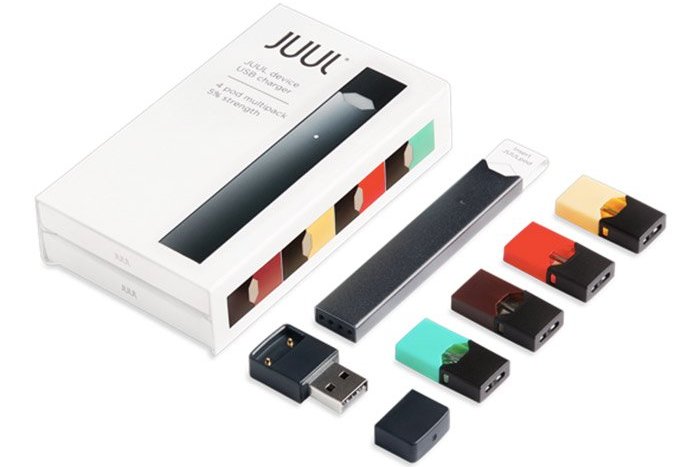
July 26, 2019
 Source/Juulvapor.com
Source/Juulvapor.com
Juul, the largest e-cigarette maker, was accused by a U.S. House subcomittee of paying schools, summer camps and other public programs to market its products to youth.
Juul deployed a "sophisticated program" that deliberately targeted children and teenagers at schools, summer camps and public programs – all in an attempt to sell e-cigarettes, according to a U.S. House subcommittee.
Juul, the largest e-cigarette seller, allegedly bought access to children as young as 8 years old by paying schools and other public programs for an opportunity to present its messaging, according to the findings of the Subcommittee on Economy and Consumer Policy.
In one case, Juul paid $134,000 to a Baltimore-based charter school to establish a five-week summer camp for 80 children in grades 3 through 12. The company sought to provide a "holistic health education program" that would engage low-income students at risk of making poor health decisions by helping them develop a personal "healthy lifestyle plan."
The findings are based on some 55,000 documents that Juul provided to the subcommittee and the Massachusettes Attorney General. They are detailed in a memo released on Thursday, the second day of public hearings in Washington.
Juul operated a Youth Prevention and Education program that paid schools at least $10,000 to access students during school hours, summer classes or special Saturday programs, according to the subcommittee. The Saturday program was designed as a disciplinary alternative for students caught vaping at school.
But Parents Against Vaping E-cigarettes testified that Juul representatives demonstrated how to use an e-cigarettes and told the children that the product is "totally safe." And emails released by the subcommittee indicate that Juul administrators worried about the optics of such programming, noting that Big Tobacco once had similar "youth education" teams that appeared at health fairs.
In one email exchange, Julie Henderson, Juul's youth prevention and education director, and Bruce Harter, a consultant, discussed cancelling a trip to a school fair near Chicago.
"The question I think you're raising with your research about the initiatives of big tobacco is how do we distinguish JUUL from big tobacco," Harter wrote. "JUUL created a product to save lives by putting combustible cigarettes out of business. The unintended consequence is that teenagers find JUULs irresistible. How can we have an impact on underage use if we limit our opportunities to interact with young people to only those that big tobacco didn't do?"
Juul also allegedly launched an social media influencer campaign to market its products to youth, hiring Grit Creative Group to secure "social media buzzmakers" with at least 30,000 followers to attend launch events. One tour was expected to introduce e-cigarettes to 1.5 million people by putting Juul products in the hands of some 12,500 influencers.
Juul released a statement saying its Education and Youth Prevention program was "short-lived," ending last September after its purpose of educating youth on the dangers of nicotine addiction "was clearly misconstrued."
The company said it launched an "industry leading plan" last November to combat youth vaping. Its efforts included ceasing the sale of flavored JuulPods to traditional retail store partners, enhancing its online age-verification process and improving retailer compliance through more than 2,000 monthly secret shopper visits.
Juul added that it has shut down its Facebook and Instagram accounts and is working to remove "inappropriate social media content" generated by others on those platforms.
Earlier this month, Juul Chief Executive Officer Kevin Burns apologized to parents whose teenagers have become addicted to nicotine by using Juul products.
"It's not intended for them," Burns said in an interview with CNBC. "I hope there was nothing that we did that made it appealing to them. As a parent of a 16-year-old, I'm sorry for them, and I have empathy for them, in terms of what the challenges they're going through."
E-cigarettes continue to be the most popular tobacco product among American youth. Some 1.5 million more youths used e-cigarettes last year than in 2017 – a surge that has drawn considerable concern from the U.S. Food and Drug Administration.
The FDA has attempted to crack down on underage vaping, which it considers a health epidemic. It has limited e-cigarette sales to brick-and-mortar stores that do not permit access to people under 18, effectively banning convenience stores and gas stations from selling them. It also increased age-verification requirements for online purchases.
Though e-cigarettes do not contain tobacco, government regulators classify them as tobacco products because most of them contain nicotine, which comes from tobacco.
Earlier this month, the FDA launched its first anti-vaping commercial aimed at preventing children from becoming addicted to e-cigarettes. The new ads are part of a $60 million marketing campaign dubbed "The Real Cost."
Follow John & PhillyVoice on Twitter: @WriterJohnKopp | @thePhillyVoice
Like us on Facebook: PhillyVoice
Add John's RSS feed to your feed reader
Have a news tip? Let us know.